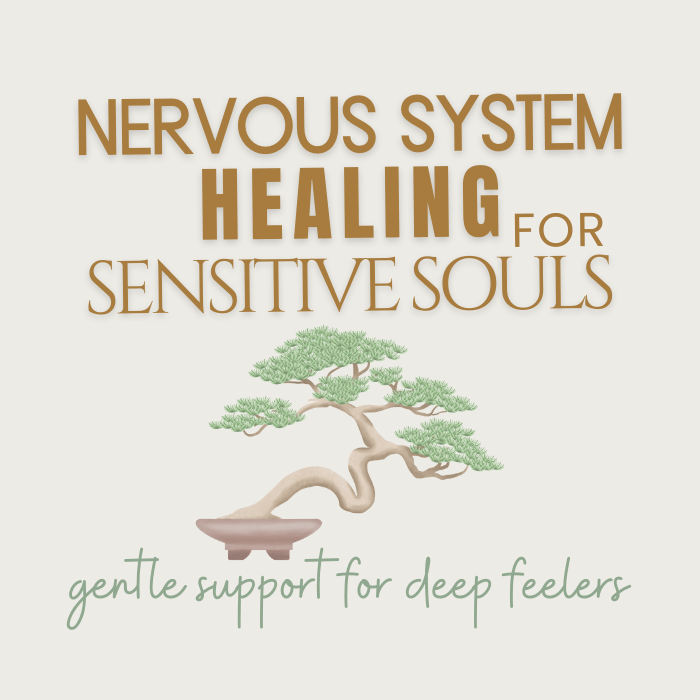How to work gently with a deep-feeling nervous system
Some of us are wired a little differently.
We feel things deeply.
~We notice subtle shifts in tone, light, energy.
We absorb the moods of others — sometimes without realizing.
This isn’t a flaw.
It’s a form of sensitivity that, when honored, becomes a strength.
But without tools or support, it can lead to overwhelm, exhaustion, and emotional shutdown.
That’s why nervous system healing for sensitive people isn’t about “toughening up” —
it’s about softening into deeper understanding.
Some links on this page are affiliate links. If you choose to purchase through them, it supports this site at no extra cost to you. Thank you for your support. 🤍
Why Sensitivity Affects the Nervous System So Deeply
If you’re a sensitive person (HSP, empathic, intuitive, or just highly aware):
- You may startle easily
- You feel others’ stress in your own body
- You need more quiet time to reset
- You feel overstimulated in bright, loud, or busy places
- You often anticipate others’ needs before your own
These aren’t weaknesses — they’re signs of a finely-tuned nervous system.
But when this system is constantly over-activated without rest, it can lead to:
- Chronic fatigue
- Burnout
- Anxiety or panic
- Emotional flooding
- Detachment from your own needs
If you’ve always felt more affected by light, sound, emotions, or energy, you may relate to the traits of a Highly Sensitive Person (HSP). Dr. Elaine Aron’s work offers science-backed insight into what sensitivity really is — and how, when supported, it becomes a deep strength.
Nervous System Work for the Deeply Sensitive
Healing doesn’t mean becoming less sensitive.
It means becoming more supported.
Nervous system healing for sensitive people is not about turning off your depth —
it’s about creating spaces, practices, and boundaries that help you stay connected to yourself while moving through the world.
Here are gentle ways to start:
Build Micro-Moments of Safety
Your nervous system responds best to soft, consistent signals.
A few minutes of grounding breath or sensory pause can restore balance.
Let Go of “Fixing” Yourself
You don’t need to be “less sensitive.”
You need better protection, nourishment, and boundaries around your gifts.
Track Overload Early
Learn to notice the first signs of overwhelm (e.g. irritability, noise sensitivity). Step back early, before full shutdown.
Rest After Exposure
Even small social interactions can take a toll.
Create post-interaction rituals to reset (warm drink, quiet walk, soft music).
Let Slowness Be Your Rhythm
Deep-feelers often need longer integration time.
Don’t rush your nervous system — trust its pace.
Emotional Patterns Often Seen in Sensitive Souls
- Fawning (prioritizing others to stay safe)
- Perfectionism (to avoid criticism)
- Emotional withdrawal (to avoid conflict)
- Over-responsibility (carrying others’ pain)
These are protective adaptations.
You learned them for a reason.
Now you get to choose new patterns — not through force, but through healing.
Gentle Supporting Resources
If you’re a sensitive soul learning to care for your nervous system, these resources may offer real support:
• Anchored by Deb Dana
A steady, gentle guide to understanding how your nervous system protects you — and how to support it with compassion instead of pressure. Especially helpful for sensitive people navigating overwhelm, relational triggers, or deep emotional waves.
• The Vagus Nerve Deck by Melissa Romano
This 75-card deck includes simple, polyvagal-informed exercises to reset your system when emotions, noise, or stress feel like “too much.” Ideal for sensitive nervous systems needing small, doable ways to return to calm.
Let your sensitivity lead you gently inward. You don’t need to be less — just more supported.
🌿 FAQ
Is being sensitive the same as being dysregulated?
Not necessarily. Sensitivity simply means you notice more.
But without regulation skills, the intensity can lead to overwhelm. Healing gives you tools to stay with your sensitivity — not collapse under it.
Can I stop taking on other people’s emotions?
Yes, over time. Boundaries are energetic as much as verbal.
The more safety and sovereignty you build internally, the less your system absorbs what isn’t yours.
Next Steps That Might Feel Supportive
- Softening the Fight-or-Flight Response
- The Body as a Compass
- Healing Emotional Patterns
- Compassion as a Healing Tool
You don’t need to shut yourself down to survive.
You get to thrive, fully alive — as you are.
Your unfolding is already underway — and it’s beautiful.

